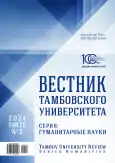Teaching sight translation to Economics and Management majors
- Authors: Stepanova M.M.1, Lukyanova V.S.1
-
Affiliations:
- Moscow State Institute of International Relations of the Ministry of Foreign Affairs of the Russian Federation
- Issue: Vol 29, No 2 (2024)
- Pages: 403-417
- Section: THEORY AND METHODS OF FOREIGN LANGUAGE TEACHING
- URL: https://journal-vniispk.ru/1810-0201/article/view/297861
- DOI: https://doi.org/10.20310/1810-0201-2024-29-2-403-417
- ID: 297861
Cite item
Full Text
Abstract
Relevance. Teaching professionally oriented translation to students in non-linguistic areas of study is important and relevant, since future specialists will have to use the foreign language as part of their professional activities, which includes the translation of professionally oriented texts. Teaching visual-oral translation (sight translation) as a separate type of professionally oriented translation for economics and management majors is considered to be necessary to prepare future graduates for successful professional activities.Research Methods. The study used methods such as qualitative and quantitative analysis of the most typical difficulties of students (emotional, cognitive and motor difficulties), as well as the errors they make when sight translating.Results and Discussion. The authors provide typological characteristics of sight translation as a separate type of translation activity. We discuss the main obstacles that students of non-linguistic areas of training encounter when mastering the skills of sight translation of texts related to economic and managerial discourse. Among them are the following: translation of terminological vocabulary, recognition of syntactic connections at the level of sentences and phrases, translation of modern realities, stylistically colored vocabulary and idioms, translation of lexical inclusions of other industry discourse. The reasons leading to distortions in translation from the sheet are analyzed, ways of overcoming translation difficulties that have been tested and have shown their effectiveness in the Odintsovo branch of Moscow Institute of International Relations of the Ministry of Foreign Affairs of the Russian Federation are considered.Conclusions. Skills of translating from a foreign language (English) into one’s native language (Russian) contributes not only to the formation of professional translation competence, but also a number of other academic and professional skills. To successfully implement this, a clear and competent course structure is required, taking into account the need to learn to translate modern English-language texts of economic discourse.
About the authors
M. M. Stepanova
Moscow State Institute of International Relations of the Ministry of Foreign Affairs of the Russian Federation
Email: m.stepanova@odin.mgimo.ru
ORCID iD: 0000-0003-0444-8155
PhD (Education), Associate Professor of English Language Department
76 Vernadskogo Ave., Moscow, 119454, Russian FederationV. S. Lukyanova
Moscow State Institute of International Relations of the Ministry of Foreign Affairs of the Russian Federation
Author for correspondence.
Email: v.lukyanova@odin.mgimo.ru
ORCID iD: 0000-0002-7532-8663
PhD (Philology), Associate Professor of English Language Department
76 Vernadskogo Ave., Moscow, 119454, Russian FederationReferences
- Shevchenko M.A., Ryumin B.A., Tavdgiridze L.A., Belov D.N. (2021). Training of interpreters for international army games. Vestnik Tambovskogo universiteta. Seriya: Gumanitarnye nauki = Tambov University Review: Series Humanities, vol. 26, no. 194, pp. 104-112. (In Russ.) https://doi.org/10.20310/1810-0201-2021-26-194-104-112, https://elibrary.ru/jkshdu
- Sineva Yu.O., Krapivkina O.A. (2014). To translator’s competence formation in the students trained in “transla-tor in professional communication program” (on example of sight translation). Vestnik Irkutskogo gosudarstvennogo tekhnicheskogo universiteta = Proceedings of Irkutsk State Technical University, no. 12 (95), pp. 448-452. (In Russ.) https://elibrary.ru/tfgcur
- Matukhin D.L. (2011). Professionally-oriented teaching foreign language to students of non-linguistic speciali-ties. Yazyk i kul’tura = Language and Culture, no. 2 (14), pp. 121-129. (In Russ.) https://elibrary.ru/nuzten
- Shveitser A.D. (2019). Teoriya perevoda. Status, problemy, aspekty [The Theory of Translation. Status, Prob-lems, Aspects]. Moscow, URSS Publ., 216 p. (In Russ.)
- Alekseeva I.S. (2004). Vvedenie v perevodovedenie [Introduction to Translation Studies]. Moscow, Akademiya Publ., 352 p. (In Russ.)
- Sdobnikov V.V. (2023). Systemic approach to translator training. Zhurnal Sibirskogo federal’nogo universiteta. Gumanitarnye nauki = Journal of Siberian Federal University. Humanities and Social Sciences, vol. 16, no. 7, pp. 1153-1164. (In Russ.) https://elibrary.ru/rnlxqs
- Frash S.S., Maksyutina O.V. (2010). Sight translation as an independent branch of translation. Vestnik Tomskogo gosudarstvennogo pedagogicheskogo universiteta = Tomsk State Pedagogical University Bulletin, no. 4 (94), pp. 76-81. (In Russ.) https://elibrary.ru/mqowqj
- Babayan V.N., Bogdanova O.Yu. (2021). On teaching sight translation as a specific type of professional activity in professional communication sphere. Yaroslavskii pedagogicheskii vestnik = Yaroslavl Pedagogical Bulletin, no. 4 (121), pp. 42-49. (In Russ.) https://doi.org/10.20323/1813-145X-2021-4-121-42-49, https://elibrary.ru/ompcyb
- Komissarov V.N. (1999). Sovremennoe perevodovedenie. Kurs lektsii [Modern Translation Studies. A Course of Lectures]. Moscow, EHTS Publ., 192 p. (In Russ.)
- Min’yar-Beloruchev R.K. (1996). Teoriya i metody perevoda [Theory and Methods of Translation]. Moscow, Moskovskii litsei, 206 p. (In Russ.)
- Kazakova T.A. (2001). Prakticheskie osnovy perevoda. English – Russian [Practical Basics of Translation. Eng-lish – Russian]. St. Petersburg, Soyuz Publ., 320 p. (In Russ.)
- Mitchell P.D., Lopatin R.D., Trusov E.V. (2021). Teaching Russian-English translation with computer games. Vestnik Tambovskogo universiteta. Seriya: Gumanitarnye nauki = Tambov University Review: Series Humani-ties, vol. 26, no. 193, pp. 7-14. (In Russ.) https://doi.org/10.20310/1810-0201-2021-26-193-7-14, https://elibrary.ru/faluss
- Alikina E.V. (2011). Quality assessment in consecutive interpreting in real life and training situations. Vestnik Nizhegorodskogo gosudarstvennogo lingvisticheskogo universiteta im. N.A. Dobrolyubova = Nizhny Novgorod Linguistics University Bulletin, no. 13, pp. 114-123. (In Russ.) https://elibrary.ru/ndvlin
- Kurz I. (2001). Conference interpreting: quality in the ears of the user. Meta, vol. 46, no. 2, pp. 394-409. http://dx.doi.org/10.7202/003364ar
- Malankhanova A.E. (2020). Teaching translation from Chinese to Russian by means of blog technology on the example of economic discourse. Vestnik Tambovskogo universiteta. Seriya: Gumanitarnye nauki = Tambov University Review: Series Humanities, vol. 25, no. 186, pp. 48-52. (In Russ.) https://doi.org/10.20310/1810-0201-2020-25-186-48-52, https://elibrary.ru/omxjgo
- Gavrilenko N.N. (2021). Osnovy didaktiki perevodcheskoi deyatel’nosti [The Basics of Didactics of Translation Activity]. Moscow, Flinta Publ., 560 p. (In Russ.) https://elibrary.ru/tzqvjg
Supplementary files








